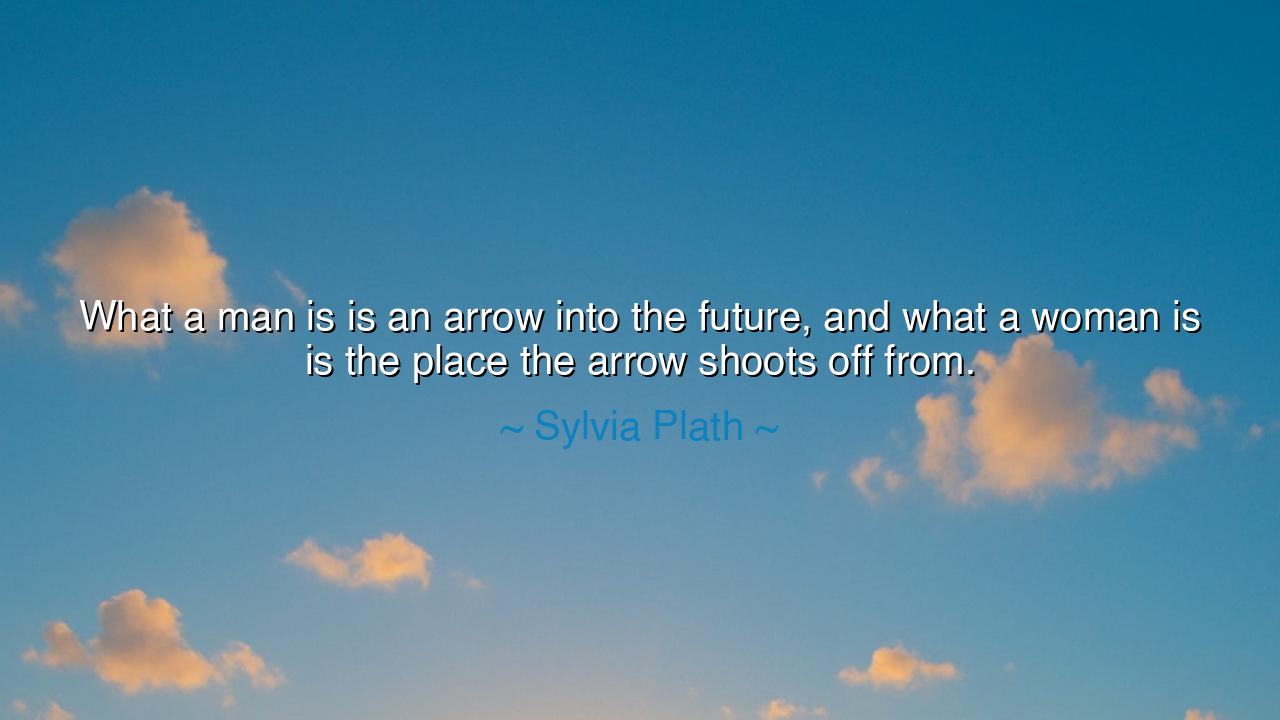
What a man is is an arrow into the future, and what a woman is is
What a man is is an arrow into the future, and what a woman is is the place the arrow shoots off from.






“What a man is is an arrow into the future, and what a woman is is the place the arrow shoots off from.” Thus spoke Sylvia Plath, the poet of fire and fragility, whose words forever bridge the realms of beauty and pain, strength and sorrow. In this profound reflection, she paints the eternal balance between motion and origin, between creation and continuity, between the force that flies forward and the ground from which it takes its flight. To understand this quote is to understand something ancient—the sacred dance of masculine and feminine, not as rivals, but as partners in the story of existence.
Plath, who lived in the trembling dawn of the modern age, wrote in a time when the roles of men and women were being broken, questioned, and reborn. She was not praising one and diminishing the other; rather, she sought to illuminate the cosmic balance that threads through all creation. In calling man an arrow into the future, she saw in him the restless drive to move, to build, to conquer, to change. Man, in her eyes, is the symbol of direction—the reaching toward the unknown, the spirit that hungers for progress and discovery. But every arrow, no matter how swift, must be launched, and it cannot fly without the strength and stillness of the bow that sends it forth.
The woman, then, is that sacred ground, the place of origin—the beginning of all movement, the silent force behind all striving. She is the source, the wellspring of life and meaning. The arrow may fly far, but it is the bow that gives it purpose, the tension that gives it power. In the deepest sense, Plath reminds us that progress without foundation is destruction, and motion without grounding is chaos. The future must always be rooted in something ancient, something nurturing, something eternal. The woman, in this metaphor, becomes not merely the supporter of destiny but its creator—the origin from which all possibility unfolds.
Consider the tale of Penelope and Odysseus, sung by the poets of old. While Odysseus sails across endless seas, seeking glory and the promise of return, it is Penelope who holds the thread of his world together. She weaves by day and unravels by night, her patience preserving the kingdom, her faith anchoring his journey. He is the arrow, ever flying forward, battling storms and monsters. She is the place he flies from—the home that gives his wandering meaning, the still point that defines his motion. Without her, his story would be only aimless flight, a journey without return.
Plath’s words also speak beyond gender—to the dual nature of the human spirit itself. Within each of us lies both the arrow and the place of its release. We all must cultivate the courage to move forward and the wisdom to stay grounded. For if we are only arrows, we lose ourselves in endless striving, never finding peace. But if we are only the bow, we stagnate in safety, afraid to release our strength into the world. Balance, then, is the secret of fulfillment—to honor both the fire that drives us and the earth that steadies us.
In her poetic soul, Sylvia Plath understood the cost of imbalance. Her life was one of intense motion—restless creation, searing intellect, deep feeling—but without the grounding peace she yearned for, that fire consumed her. From her own tragedy, we may learn: the future is not something we hurl ourselves into blindly, but something we build upon the sacred soil of understanding, tenderness, and love. The arrow must trust the bow, just as the bow must release without fear.
From this truth flows a lesson for all who listen: honor both the movement and the origin. Men and women, dreamers and builders, creators and nurturers—all are bound in a shared destiny. Do not despise the stillness that gives you strength, nor the striving that calls you forward. In your relationships, seek not domination, but balance—the flight of one supported by the faith of the other. Let your future rise from the firm ground of care and mutual respect, for every great leap forward must be rooted in love.
And when you stand at the edge of tomorrow, remember Sylvia Plath’s wisdom: that the arrow and its source are one—neither greater nor lesser, but parts of the same eternal motion. One moves the world; the other makes that movement possible. In that harmony lies the secret not only of love, but of life itself.






AAdministratorAdministrator
Welcome, honored guests. Please leave a comment, we will respond soon